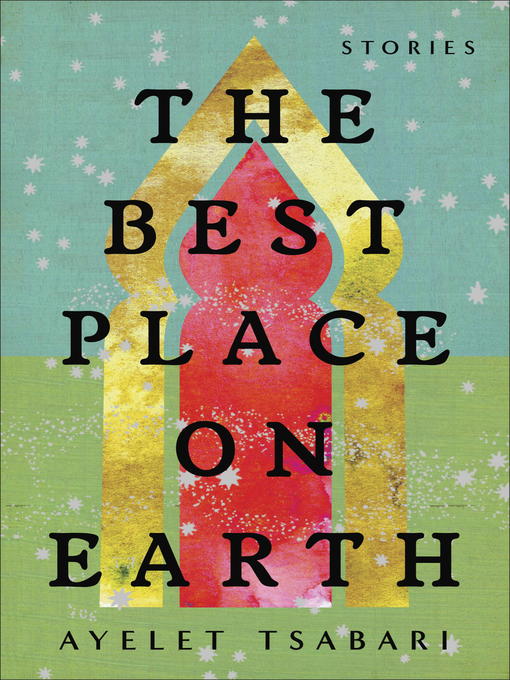
The Best Place on Earth
Stories
کتاب های مرتبط
- اطلاعات
- نقد و بررسی
- دیدگاه کاربران
نقد و بررسی

May 6, 2013
This short story collection is a fiction debut for Tsabari, but it demonstrates that she is already a talented storyteller. An Israeli of Yemeni descent who immigrated to Canada in 1998, she perceptively observes life and its differences in Israel and Canada while skilfully inhabits a broad range of characters and voices. A man longs for his lost love. A Yemeni-Israeli grandmother travels to Toronto to see her first grandson, only to discover that her daughter and son-in-law refuse to have him circumcised according to their tradition. A Filipina caregiver lives a precarious existence as an illegal worker in Israel. Tsabari writes about her characters' near misses when suicide bombers fulfill their mission, marriages stung by unfaithfulness, and sisters struggling to reconnect and close the distance between their lives in Jerusalem and Vancouver. Her writing has an immediacy and power that invites readers into her characters' psyches: "Reuma lost her daughter over and over again: first she became Ashkenazi, then Canadian; it was in her melody of speaking, the polite words she'd started peppering her sentences with, the way she smiled at passersby on the streetâ¦. A stranger. And now she was no longer Jewish." Tsabari' characters will step off the page to captivate readers. Distribution: HarperCollins Canada

Starred review from January 15, 2016
Where is the best place on Earth? The characters in Tsabari's debut collection (winner of the Sami Rohr Prize for Jewish Literature) are searching for somewhere to feel at home, whether they're travelers, emigrants, or just restlessly living in the place they were born.Tsabari was born in Israel to a family of Yemeni descent, and she moved to Vancouver in 1998; she only started writing in English 10 years ago. Her Israeli characters feel out of place in their own country because, like Tsabari's family, they come from Arab backgrounds and aren't Ashkenazi, like most Israeli Jews; some have left for Canada or Britain. In "A Sign of Harmony," Maya travels to India with her new boyfriend, Ian, who has an Indian father and an English mother and has never been to India before. It's her fourth trip--she travels there each fall to buy fabrics and other merchandise to sell in Europe--and she feels more at home than he does. Several of Tsabari's characters are traversing the foreign land of adolescence, trying to make friends and test their sexuality while dealing with larger forces. Lily moves from Canada to Israel to live with her aunt after her mother dies, and is scared and thrilled when her new friend Lana kisses her. But her family's identity is always in the background when she's in Israel: "My grandparents came from Yemen, so we are Arabs in a way, Arab Jews." Seeming contradictions like that are everywhere in Tsabari's world. In "Invisible," Rosalynn is a Filipino immigrant who's overstayed her visa; she takes care of an old woman she calls "Savta," Hebrew for "grandmother," who also takes care of her. Characters embrace their mandatory army service, run away from it, or use it to their own ends. In the stunning opening story, "Tikkun," the first-person narrator runs into his ex-girlfriend, whom he hasn't seen in seven years, and is surprised to see she's become an Orthodox Jew. As they sit down to share a coffee, the narrator scans the patio, taking in the other patrons: "We are all trained to identify potential threats." One woman grew up in a small town in the Sinai, which she was forced to leave when Israel returned the peninsula to Egypt, but she doesn't want to label her family as "settlers"--"It was different then. They didn't go there for ideological reasons." But is it possible to be innocent in this world?Tsabari creates complex, conflicted, prickly people you'll want to get to know better.
COPYRIGHT(2016) Kirkus Reviews, ALL RIGHTS RESERVED.

November 15, 2016
The Sami Rohr Award encourages and promotes outstanding writing of Jewish interest by awarding a $100,000 prize to an emerging writer. Tsabari won in 2015 for this captivating collection that focuses on characters of Mizrachi background--Jews of Middle Eastern and North African descent. The Israeli novelist of Yemeni descent, who moved to Canada in 1998, uses her stories to explore growing up amid conflict and how it shapes identity and one's search for home.
Read-Alikes Danit Brown's Ask for a Convertible: Stories, Nomi Eve's Henna House, Lucette Lagnado's The Man in the White Sharkskin Suit, and Shelly Oria's New York 1, Tel Aviv 0: Stories.
Copyright 2016 Library Journal, LLC Used with permission.

October 15, 2015
Born in Israel of Yemeni descent and now living in Toronto, Tsabari offers a story collection ranging from God-drenched Jerusalem to chill-swept Canada and featuring characters in search of meaning and belief. It recently won the Sami Rohr Prize for Jewish Literature and was nominated (in its Canadian edition) for the Frank O'Connor International Short Story Award. Random has also bought a memoir and a novel from Tsabari.
Copyright 2015 Library Journal, LLC Used with permission.

























دیدگاه کاربران